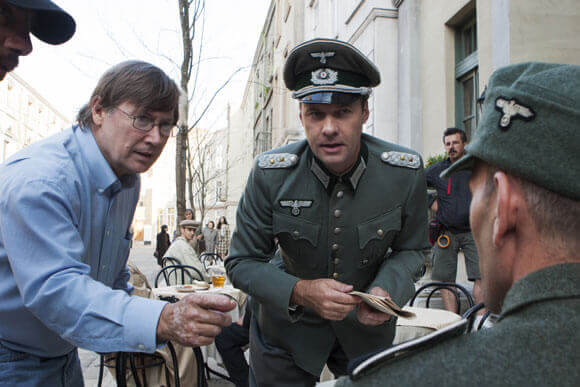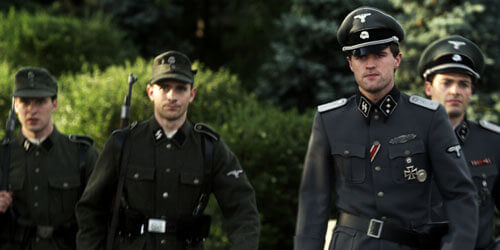
Director/producer Mark Schmidt won’t discuss the budget he had to work with on Walking with the Enemy, only saying it was between $100 and $100 million. But even without knowing the exact amount, I’m confident in stating that every penny of the budget made it onto the screen in this inspirational story based on the real-life actions of war hero Pinchas Rosenbaum.
Walking with the Enemy is set in Hungary in the final months of World War II when the Nazis turned their attention to wiping out Hungary’s Jewish population. Jonas Armstrong stars as Elek Cohen (a character based on Pinchas Rosenbaum), a young man who escapes from a labor camp only to discover his family has been ‘relocated’. Desperate to find his family, Elek does the unthinkable – he steals a uniform and masquerades as a Nazi in order to save as many Jewish lives as possible.
In support of the film’s April 25, 2014 theatrical release, director Schmidt talked about screening the film to survivors, his cast led by Armstrong and featuring Sir Ben Kingsley, and the goal of telling inspirational stories through Liberty Studios.
Director Mark Schmidt Walking with the Enemy Interview
It’s such an expansive story. Was there anything you couldn’t do based on budget constraints?
Mark Schmidt: “Well, I think any filmmaker always wants to add more to it. We’re under a time constraint to keep the film around two hours, so there’s always more that I think anybody would want to do, but it came together pretty good. I’m just hoping a lot of people can see it. From the test audiences, everybody that sees it loves the film, so I think it’s just getting them into the theaters to see it.”
Unfortunately, I don’t know much about Hungary during World War II. How close is the film to actual events?
Mark Schmidt: “Every event that you saw is a true event. Everything you saw, I just tried to portray everything historically as true as possible. Again, we are making a movie; it’s not a documentary, but our hero is based on Pinchas Rosenbaum. Regent Horthy and his son is true. Otto Skorzeny comes to town to take care of problems is true. Adolf Eichmann and Wisliceny, they are the villains – they’re evil guys – and they were all true people there.”
How did you know how far you could push showing the violence of war?
Mark Schmidt: “You know, in editing and filming I tried to do it as tastefully as possible so people would feel the realism. I’ll tell you, the survivors that have come and seen this film, they’ve told me, ‘Mark, you are right on.’ But I didn’t want to make it too unbearable and I wasn’t even sure if we were ever going to get a PG-13 rating out of this. It was interesting working with the MPAA because they do care about what’s out there, but when you think about it it’s just the realism and the emotion. That was the main thing was the realism and the emotion.”
You’ve shown the film to survivors? Was that a special screening?
Mark Schmidt: “I’ve had some that I’ve invited them to come see and then other ones that showed up. We were in some film festivals and they would show up and see it and come talk to me afterwards. We had a premier at the Museum of Tolerance up in Los Angeles that survivors were invited to. They all say it’s portrayed and feels real, and even when we were filming I had shown it to people at that time, survivors or people that hid out during the war. It was interesting and I did learn a lot about human nature while working on this story.
I was just amazed how the good and the evil in people can come out depending on when there are important decisions to be made. And then you have a lot of people that just kind of follow the leader. Some of these survivors told me they were in small towns or whatever and they’re friends with these people, they’re neighbors for a zillion years and then Nazis come to town and all of a sudden the Jewish community is the enemy just overnight. And then other people, there’s a lot of unsung heroes that really risked their lives to help their Jewish friends. I just think it’s important to show the human spirit of some of these people with a good heart that did the right thing.
And you’ve got to remember Pinchas Rosenbaum didn’t have any army or government behind him. He just went out there on his own and risked his life to do what he could do to help these innocent people.”
What was it like for you as the director and producer and someone who had been working on the film for such a long time to actually screen it for survivors? That must be very emotional for everyone involved.
Mark Schmidt: “Yes. You know, when they come up to me, and they’ve got tears in their eyes and they give me a hug and they thank me, it does feel good. And then for people that have no connections, even they would come up to me and say, ‘Mark, I’ve got to admit you got tears out of me.” The men usually don’t want to say that.”
Mark Schmidt: “We auditioned several people and Mr. Armstrong is just a great actor. I’ll tell you, these actors from London they really know their craft. They really study it. I don’t know if it has to do with Shakespeare or something hundreds of years ago, but they really go to school to learn the craft and they’re in theatre and television and movies and so on. But Jonas Armstrong, I think he is somebody who is a rising star – and he is such a nice gentleman. He worked really hard and he has got such great range. A lot of times we were adapting to our environment of the location and so we had to rewrite things or whatever, and great actors they can really think about it and come to life. I’m glad we chose him and he is a very nice gentleman.
The rewrites had to do with the physical locations or the shooting schedule?
Mark Schmidt: “You have a script, but sometimes because you see this great location or something, we were constantly trying to make the film better and better. Randy Williams, the producer and a friend of mine, we were both working and […]we were only getting four, five, six hours of sleep every night and working seven days a week. You’re constantly visiting locations, adapting to what you have to work with, those type of constraints.
We were trying to get the best quality locations and production value we can, and I think we chose a great production designer. I think the gentleman’s very talented and we were just trying to do everything as authentic as possible and to acquire all these uniforms and military goods and everything. We had things coming from several countries that were being shipped there and you’re really networking a lot with museums and places to get pieces because we were trying to make it as authentic as possible and have that authentic look.”
And you’ve also got Sir Ben Kingsley in your cast playing Regent Horthy.
Mark Schmidt: “He is such a true hard-working actor, a very professional man and we were just honored to have him in the film. He worked extremely hard and we were just honored and so thankful he was in our film.”
Of course you have scenes of war, but there are quieter moments and in particular one scene stands out in which Jewish citizens are lined up facing a wall waiting to be executed and you focus on an actress who’s shivering, has a runny nose, and genuinely looks scared to death. Can you talk about setting up that scene?
Mark Schmidt: “Yes. We were trying to portray the true horror and terror that those innocent people went through, and I’m trying to have people when they see her they think as though if they were in that position and how terrible things were. The whole film, that was the goal is to show what happened to innocent people during those times. We are so lucky in this country never to have had to experience such terrible things.
I was also trying to show what it was like before things happen with the way we started the film with the dancing and everything. Historically, Hungary was in relative peace during the war. It wasn’t until the Germans invaded that terror came to their country.
But the actress there did an excellent job. She’s such a nice actress. In fact, there’s a funny story and she never told me this but I heard it from another actress that one day – it was a day she was off – and she was out visiting in the downtown area of this big city and she got surrounded by three young kids. I don’t know if they were 15 or 16 or something and they demanded her purse and she tried to fight them off and they eventually got it and took it. But she is such nice person she never told me about that. She is just a really nice young lady.”
That’s so sad for her. I hope the rest of the shoot wasn’t like that.
Mark Schmidt: “That was the only time we heard anything bad happen and she didn’t even tell us about it.”
You are a founder of Liberty Studios. Why is now a good time industry-wise to have your own studio and to commit to doing inspirational films?
Mark Schmidt: “I just want the film to come out, I guess, maybe the way we want it to come out. What you see is I didn’t want to lose control of it and I wanted the story and everything with it to come out the way you see. The goal is to have more control in getting a good film out there. Our goal is mainly to just do inspirational true stories to kind of honor and celebrate individuals that went beyond, who have a good heart and help people. Believe me there were so many during World War II, there are so many good people out there that risked their lives that nobody knows about, just helping people. So that’s the goal of our studio.”
Will you be revisiting World War II with another film, given the fact there are so many inspirational stories to tell?
Mark Schmidt: “We would like to but people think, generally speaking, the public doesn’t like period pieces so I don’t know. We are kind of interested to see how this works out in theaters. It will be interesting to see what the audience reaction is. I know in all the film festivals people would clap at the end of the film.”







